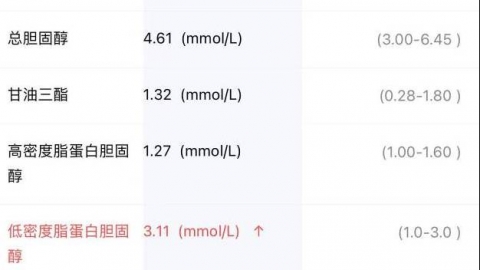What are the causes of mildly low total cholesterol?
Generally, a mildly low total cholesterol level may be caused by an unreasonable diet structure, excessive exercise, weakened absorption function, mild liver dysfunction, hyperthyroidism, and other factors. If experiencing discomfort, it is recommended to seek timely medical attention. Detailed analysis is as follows:
1. Unreasonable Diet Structure
Long-term vegetarianism or insufficient intake of meat and eggs may lead to insufficient raw materials for cholesterol synthesis, resulting in mildly low total cholesterol. It is recommended to adjust the diet structure by appropriately increasing intake of cholesterol-rich foods such as eggs, lean meat, and deep-sea fish, ensuring balanced nutrition and avoiding excessive dieting.
2. Excessive Exercise
Long-term high-intensity exercise increases energy consumption and cholesterol utilization, which may cause a mild decrease in total cholesterol. It is important to arrange exercise intensity and duration reasonably, reduce high-intensity workouts, choose moderate exercises like jogging or yoga, and replenish nutrients promptly after exercising.

3. Weakened Absorption Function
Gastrointestinal dysfunction may impair absorption function, leading to reduced cholesterol absorption and mildly low total cholesterol levels, which may be accompanied by bloating and diarrhea. Patients should take medications such as multienzyme tablets, Bifidobacterium triple viable capsules, and compound digestive enzyme capsules under a doctor's guidance to improve digestion and absorption.
4. Mild Liver Dysfunction
The liver is the primary site of cholesterol synthesis; mild liver dysfunction can affect cholesterol production, causing low total cholesterol levels, which may be accompanied by fatigue and reduced appetite. Under medical guidance, patients should take medications such as silybin capsules, compound glycyrrhizin tablets, and inosine tablets to protect liver function.
Excessive secretion of thyroid hormones accelerates cholesterol metabolism, lowering total cholesterol levels, which may be accompanied by palpitations and excessive sweating. Patients should take medications such as methimazole tablets, propylthiouracil tablets, and metoprolol tartrate tablets under a doctor's guidance to regulate thyroid function and reduce cholesterol metabolism.
In daily life, it is important to maintain a regular routine and avoid excessive fatigue; undergo regular physical examinations to monitor cholesterol and other health indicators; and maintain a positive mindset to avoid excessive mental stress.









